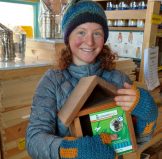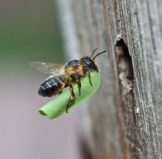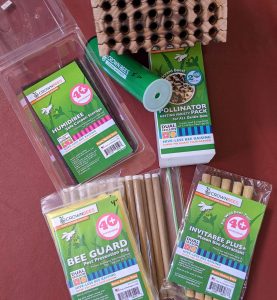 If you were lucky enough to get any mason bees nesting this spring, you’ll want to coddle them through the winter. Their populations are down throughout Boulder County because of the weather, and Tom Theobald, our usual supplier, isn’t even sure whether he’ll have any for sale next spring.
If you were lucky enough to get any mason bees nesting this spring, you’ll want to coddle them through the winter. Their populations are down throughout Boulder County because of the weather, and Tom Theobald, our usual supplier, isn’t even sure whether he’ll have any for sale next spring.
Mason and other native bees should be brought into a sheltered place with ambient (outdoor) temperatures, but with less fluctuation. These bees would normally nest in holes in tree trunks, which offer more stability in terms of temperature, moisture and, of course, protection from predators. Mason bees are already adults now and are safe to handle in their cocoons. If you used liners or reeds, take them out of the guard tubes and shelters and store them in the fridge. Ideally, unwrap the liners/reeds and just overwinter the mason bee cocoons. Place them in a Humidi-bee chamber and keep the lower pad moist.
 You can do the same with leaf cutter bees but handle them very carefully as they aren’t yet mature. Our supplier, Crown Bees, will be livestreaming a cocoon harvesting demo on Saturday. We also have large organza bags for storing blocks or shelters to protect from parasitoid wasps.
You can do the same with leaf cutter bees but handle them very carefully as they aren’t yet mature. Our supplier, Crown Bees, will be livestreaming a cocoon harvesting demo on Saturday. We also have large organza bags for storing blocks or shelters to protect from parasitoid wasps.
Now is a good time to stock up on supplies for the spring, replacing single use tubes and liners to provide clean sheets and immediate vacancy in your spring mason bee hotel! Many folks have been asking about releasing bees in the spring. We now have a special tube designed for exactly that which should make the process easier and clearer.

